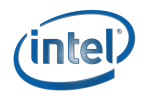Gadi Singer, Vice Presidente di Intelâs Mobility Group, e Doug Davis, Vice Presidente di Intelâs Digital Enterprise Group hanno svelato le caratteristiche della nuova soluzione SoC (System On a Chip) dedicata a sistemi embedded (telefonia cellulare, POS, etc).
I processori Intel EP80579 sono basati su processori Pentium M (probabilmente anche Atom) con integrati Memory Controller Hub (MCH), I/O hub (ICH) ,TDM e in alcuni casi sarà disponibile un sistema di accellerazione Intel QuickAssist Technology.
Importante è il supporto di questi chip all'architettura x86.
Innumerevoli saranno le applicazioni dove potrà trovare spazio questa nuova soluzione che ha ridotto spazi e consumi: console portatili, smartphone/palmari, Home Entertainment, Apparecchiature biomedicali, elettrodomestici, PLC.
| Intel EP80579 Integrated Processor with Intel QuickAssist Technology* |
| Model | Core | DDR2 | Temperature | L2 Cache | TDP |
| NU80579EB600C | 600MHz | 400/533/667 | Commercial 0-70°C | 256KB | 13W |
| NU80579ED004C | 1.066GHz | 400/533/667/800 |  Industrial -40-85°C | 256KB | 20W |
| NU80579ED004CT | 1.066GHz | 400/533/667/800 | Commercial 0-70°C | 256KB | 20W |
| NU80579ED009C | 1.2GHz | 400/533/667/800 | Commercial 0-70°C | 256KB | 21W |
| Intel EP80579 Integrated Processor for Embedded Computing |
| Model | Core | DDR2 | Temperature | L2 Cache | TDP |
| NU80579EZ600C | 600MHz | 400/533/667 | Commercial 0-70°C | 256KB | 11.5W |
| NU80579EZ600CT | 600MHz | 400/533/667 | Industrial -40-85°C | 256KB | 11.5W |
| NU80579EZ004C | 1.066GHz | 400/533/667/800 | Commercial 0-70°C | 256KB | 18W |
| NU80579EZ009C | 1.2GHz | 400/533/667/800 | Commercial 0-70°C | 256KB | 19W |
| | |
| | |
| | |







